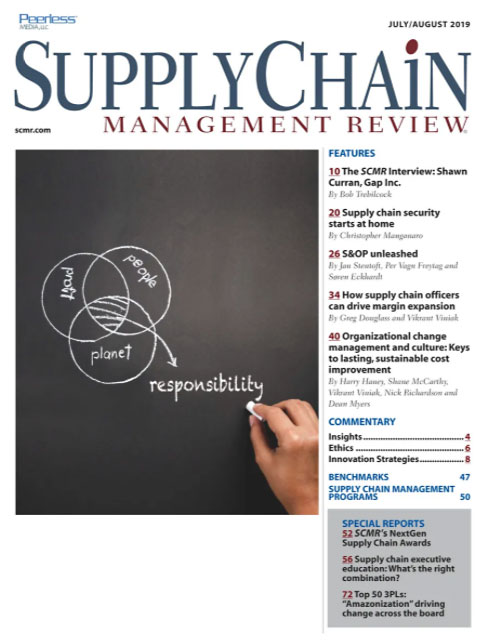Sorry, but your login has failed. Please recheck your login information and resubmit. If your subscription has expired, renew here.
July-August 2019
If you’re a long-time reader of Supply Chain Management Review, you’re familiar with Larry Lapide’s “Insights” column. Typically, Larry is writing about the many facets of planning, but occasionally, he takes on a provocative topic. One year, he questioned whether it was necessary to be a Top 25 supply chain leader, especially if in your industry, good enough gets the job done. Browse this issue archive.Need Help? Contact customer service 847-559-7581 More options
Done well, sales and operations planning (S&OP) aligns an organization’s assets with the demand for its products. That sounds good, but all too often S&OP efforts come up short in this quest. Despite diligent efforts to succeed, it is not uncommon for companies to struggle with a range of shortcomings, ranging from lengthy time-to-market processes, imbalances between manufacturing and sourcing costs and low capacity utilization, to name just three.
How can that be? The truth is that S&OP is relatively easy to understand but difficult to implement—and not for the reasons most people think.
At its core, S&OP is all about tearing down silos that have historically allowed departments (sales, production and purchasing) to optimize their piece of the supply chain at the expense of the whole. A highly functional S&OP program changes all of that and aligns key performance indicators (KPIs) across the company. But it doesn’t always work out that way, and often KPIs are different than before but no better aligned.

This complete article is available to subscribers only.
Log in now for full access or start your PLUS+ subscription for instant access.
SC
MR
Sorry, but your login has failed. Please recheck your login information and resubmit. If your subscription has expired, renew here.
July-August 2019
If you’re a long-time reader of Supply Chain Management Review, you’re familiar with Larry Lapide’s “Insights” column. Typically, Larry is writing about the many facets of planning, but occasionally, he… Browse this issue archive. Access your online digital edition. Download a PDF file of the July-August 2019 issue.Done well, sales and operations planning (S&OP) aligns an organization's assets with the demand for its products. That sounds good, but all too often S&OP efforts come up short in this quest. Despite diligent efforts to succeed, it is not uncommon for companies to struggle with a range of shortcomings, ranging from lengthy time-to-market processes, imbalances between manufacturing and sourcing costs and low capacity utilization, to name just three.
How can that be? The truth is that S&OP is relatively easy to understand but difficult to implement—and not for the reasons most people think.
At its core, S&OP is all about tearing down silos that have historically allowed departments (sales, production and purchasing) to optimize their piece of the supply chain at the expense of the whole. A highly functional S&OP program changes all of that and aligns key performance indicators (KPIs) across the company. But it doesn't always work out that way, and often KPIs are different than before but no better aligned.
SC
MR

Latest Supply Chain News
- Made in Mexico, manufactured by China
- Retail sales see gains in October, reports Commerce and NRF
- Balancing green and speed: Home delivery insights from the pandemic era
- AdventHealth named top healthcare supply chain by Gartner
- Geopolitical readiness in supply chains: Strategic challenges for leaders
- More News
Latest Podcast

 Explore
Explore
Business Management News
- Made in Mexico, manufactured by China
- Retail sales see gains in October, reports Commerce and NRF
- Balancing green and speed: Home delivery insights from the pandemic era
- AdventHealth named top healthcare supply chain by Gartner
- Unlocking retention: The role employee engagement plays
- Can supply chain managers embrace an entrepreneurial mindset?
- More Business Management
Latest Business Management Resources

Subscribe

Supply Chain Management Review delivers the best industry content.

Editors’ Picks





